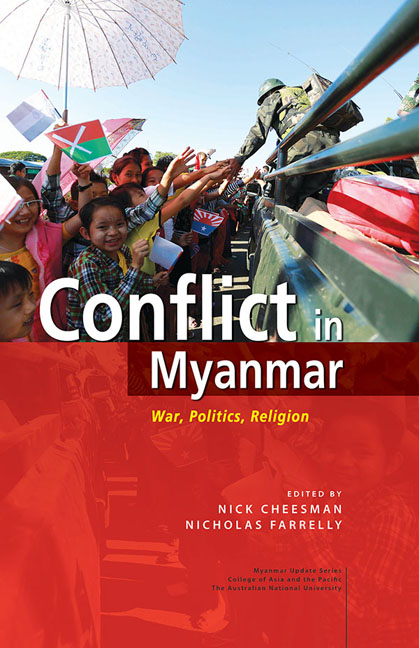Book contents
17 - Myanmar and the promise of the political
from Part V - Conclusion
Published online by Cambridge University Press: 22 July 2017
Summary
For half a century, politics — or rather, the political — were banished from Myanmar. The country's military rulers, having found they lacked political aptitude, instead attempted to generate power “from a society of disconnected singulars” (Wolin 2004, p. 246). In the place of politics, Myanmar got law and order: a mode of association whereby essentially administrative mechanisms coerce people to remain immobilized and quietened (Cheesman 2015a, p. 35).
Well, politics are back. The National League for Democracy, led by Daw Aung San Suu Kyi, has yet again proven itself worthy successor of U Nu's Anti-Fascist People's Freedom League, that unbeatable vote winner of 1950s Burma before the military shut politics down.
But it is not just that with the general election of 2015, on which Michael Lidauer (2016) offers an informative commentary in this publication, we witness the return of politics. The chapters assembled here under the rubric Conflict in Myanmar reveal their return from a variety of angles, and in a host of settings.
What does it mean to talk about the return of politics to Myanmar? How are politics differentiated from “the political” promised in this chapter's title? And what is the relationship of each to conflict?
A convenient place to start on these questions may be with the distinction Chantal Mouffe (2005, p. 9) makes between politics and the political, where the former concerns “the set of practices and institutions through which an order is created” for the organisation of human existence, while the latter refers to the “dimension of antagonism” that is constitutive of human relations (see also Wolin 2004, p. 40). For Mouffe, the political does not reside in elections or in a ruling organisation or set of institutions, as Max Weber (1968, pp. 54-55) would have it. Those arrangements are the stuff of politics. The political is more like a condition in which we disagree but also together try to figure out how to decide on stuff that matters without attempting to kill one another. It is a manner of relating to difference, as Dipesh Chakrabarty (2002, p. 140) has written, in which “difference is neither reified nor erased but negotiated”. In sum, the political is concerned with rivalry among collectivities recognizing one another as substantive equals who communicate hostility dialogically through fundamentally nonviolent means.
- Type
- Chapter
- Information
- Conflict in MyanmarWar, Politics, Religion, pp. 353 - 366Publisher: ISEAS–Yusof Ishak InstitutePrint publication year: 2016

